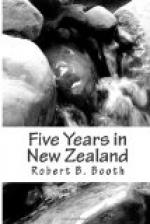I have frequently killed six or eight weekas in a single evening at my camp fire. I did not, however, eat all the drumsticks.
We were up betimes, and after a hearty breakfast started for our last pull to the head of the lake, which we reached in the forenoon. The heaviest part of the work, however, had yet to come—namely, pulling the boat a mile up the stream which flows into the lake. This was unavoidable, as the land each side was an impassable swamp. For the last half-mile the current was so swift we could make no headway against it with the oars, and the water being only from one to two feet deep, we got out and waded, hauling the boat by hand to the landing place. Here we had to transfer provisions from the boat to our own backs and trudge on foot over nearly two miles of rough and partly swampy ground to the forest where Brand had his hut, in which we intended to camp that night. It was fairly late in the afternoon when we reached the hut, and we were not sorry to relieve ourselves of our burdens and partake of food.
It was a rough camp, and as wild a situation as one could find, and it was a rough-looking lot of men that night who occupied it, in the depth of a black pine forest with the glaring light of a huge fire illuminating the recesses of the overhanging trees and dense underwood, increasing the darkness beyond, with the ominous cry of the mawpawk and laughing jackass only breaking the dead stillness. We were soon rolled in our blankets around the fire, and slept like men who had earned their rest.
The following day we rested and prepared for our excursion into the new country, and expecting to be absent two days took with us enough food for so long. In addition to our blankets we carried each a bag of ship biscuits, some tea, sugar, and cooked mutton, with a small kettle and two tin panakins.
The first day we proceeded nearly five miles up the valley, which was from 1/2 to 3/4 mile wide, much of it swampy and scored by deep-water channels, many of which were now dry, but partly covered or concealed by long tussock roots more or less burnt. On each side were low rugged hills covered with dense scrub, some portions of which had been burnt by fires which had crept up there from lower down the lake. Where the fire had done its work the ground was a foot deep in ashes and charred bits of timber, while studded about, or covered over with burnt debris were innumerable half burnt stumps; altogether it was not a locality one would select for a pleasant walk.
In some few places where rain had washed away the ashes the tussock roots were beginning to sprout, and it was not difficult to see that in course of time there would be an improvement in the land, but there was not much of it on the flats, while the hills would be for years almost impracticable. Besides, it was exceedingly difficult of access and stock would in all probability require to be transported thither by boat.




